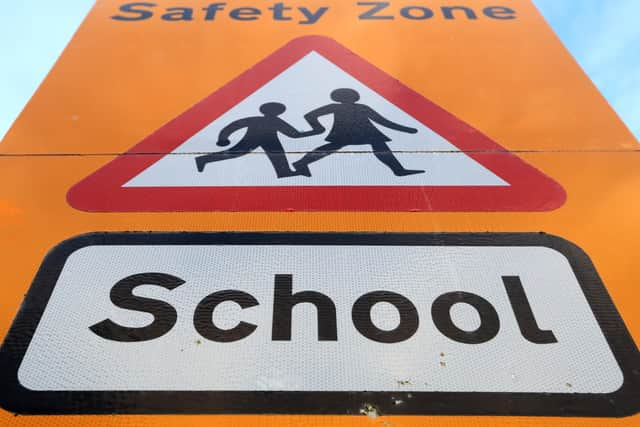The trauma scars of ‘school phobia’ have never left me, that’s why the government poster on truancy is tone deaf - Jayne Dowle
Children’s commissioner Rachel de Souza says this equates to 1.8m children, estimating that 100,000 of these are “playing truant”, a phrase which demands greater scrutiny, but we’ll come on to that.
So what does the government do? Comes up with a poster that children’s campaigners are blasting as ‘tone deaf’ showing a happy, smiling young girl in school uniform with the tagline “This morning she was worried about school… but look at her now!”. If I’d have seen that at the age of 11 or 12, when I was so fearful of school that I made myself ill, I’d have felt like I’d been kicked in the guts.
Advertisement
Hide AdAdvertisement
Hide AdMore than 40 years ago, which sounds like an age, but remains as real in my memory as yesterday, I was what’s now known as a school-avoidant child. For two or three years, from starting secondary school to the end of the third year (now Year 9), I was in and out of the classroom. I left school with just five O Levels (now GCSEs), failing maths and science.


I’d loved my primary school, but from the moment I walked through the doors of that comprehensive, my heart sank, my stomach churned and I just wanted to run home.
A bright kid, who loved reading and learning, I was bullied by those who just wanted to mess about in class, then picked on for being fashion-conscious, and later, attacked for attracting the attention of boys in the years above.
Confiding in a teacher or a mentor (we had no such thing as mentors), would have been unthinkable, telling a friend impossible, admitting the truth to my parents, too distressing to consider – they had taken me to doctor after doctor, but not one of these professionals sussed that my constant nausea and anxiety had a psychological cause.
Advertisement
Hide AdAdvertisement
Hide AdI can still recall the antiseptic smell of the school’s ‘sick room’ where I would go and see the matron, conjuring up some illness that would release me from the torture of the corridors and the playground.
Nothing felt as euphoric as sitting on the bus home, knowing I was only minutes away from hiding in my bedroom, where I’d devour Catherine Cookson novels and try not to think about ever having to go back.
Back then, no-one was familiar with the condition ‘schoolphobia’, nor paid even a fraction of the interest in the mental wellbeing of young people we do today. And even though most schools now take bullying very seriously indeed, and monitor missing kids more rigorously than ever, still the issue of persistent absence is not going away, in fact it is getting worse.
So you can see why the government feels the need to convince children – and their parents – that school attendance should be taken seriously. But have the experts at the Department of Education, and the NHS, which has added its logo to the poster, actually considered some of the reasons why the thought of school is so terrifying for millions of pupils?
Advertisement
Hide AdAdvertisement
Hide AdIt's not just psychological fears, or intimidation, that frightens children; ‘playing truant’ can have many causes. Family poverty, when youngsters are so ashamed of lacking the correct uniform or the ‘right’ shoes, can cause them to retreat into anxious shells.
Parental collusion, when school is not taken seriously in the home and days off under a duvet are considered perfectly acceptable, is another factor that demands close unpicking. And diagnosed illness, mental or physical, can make getting through the school gates feel like an unsurmountable hurdle.
In the end, and after two close family bereavements that brought me some perspective, I returned to school full-time when I was 14, but the trauma scars have never left me.
I watched my own two children, now 18 and 21, like hawks in case of similar issues. But despite their own personal challenges, and with the dedicated support of school counsellors, they managed to complete their studies without prolonged periods of absence.
Advertisement
Hide AdAdvertisement
Hide AdAll parents should be concerned by the government’s sledgehammer approach, because you never know – tomorrow it could be your child refusing to go to school.
Clearly, children do better and enhance their future life chances when they engage with education. Bullying the bullied though? That’s absolutely the wrong way to go about it.
Comment Guidelines
National World encourages reader discussion on our stories. User feedback, insights and back-and-forth exchanges add a rich layer of context to reporting. Please review our Community Guidelines before commenting.
